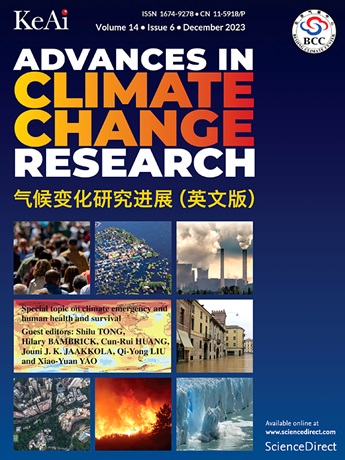Recent warming trends in Antarctica revealed by multiple reanalysis
IF 5.2
1区 地球科学
Q1 ENVIRONMENTAL SCIENCES
引用次数: 0
Abstract
The lack of long-term in-situ observations hampers our ability to fully understand climate change in Antarctica. State-of-the-art reanalysis datasets fill a critical gap, and this study utilizes the ensemble mean from five reanalysis datasets to examine temperature changes and their associated mechanisms in Antarctica. The findings reveal that the entire Antarctic continent has experienced significant warming from 1980 to 2023, with a statistically significant warming rate of 0.12 °C per decade at the 0.05 level. Further analysis suggests that the warming in Antarctica is primarily driven by thermodynamic processes, contributing to an increase of approximately 0.22 °C per decade. In contrast, dynamic processes have caused an overall cooling of the Antarctic continent at a rate of −0.10 °C per decade, partially offsetting the effects of thermodynamic processes. Additionally, the ensemble mean confirms a notable shift in temperature trends in the early 2000s. Finally, the study shows that in East Antarctica, dynamic processes primarily drive the shift in temperature trends, while in West Antarctica and the Antarctic Peninsula, thermodynamic processes are the main contributors. This research offers valuable insights into the complexities and mechanisms of climate change in Antarctica, emphasizing the importance of accurate predictions for future changes in this critical region.
多重再分析揭示了南极最近的变暖趋势
缺乏长期的现场观测妨碍了我们充分了解南极洲气候变化的能力。最新的再分析数据集填补了一个关键的空白,本研究利用来自五个再分析数据集的总体平均值来研究南极洲的温度变化及其相关机制。研究结果表明,1980 - 2023年整个南极大陆经历了显著变暖,在0.05水平上,每10年的变暖速率在统计学上显著为0.12°C。进一步的分析表明,南极洲的变暖主要是由热力学过程驱动的,每十年增加约0.22°C。相比之下,动力过程导致南极大陆以每十年−0.10°C的速度整体降温,部分抵消了热力学过程的影响。此外,总体平均值证实了21世纪初温度趋势的显著变化。最后,研究表明,在东南极洲,动力过程主要驱动温度趋势的变化,而在西南极洲和南极半岛,热力过程是主要的驱动因素。这项研究对南极洲气候变化的复杂性和机制提供了有价值的见解,强调了对这一关键地区未来变化进行准确预测的重要性。
本文章由计算机程序翻译,如有差异,请以英文原文为准。
求助全文
约1分钟内获得全文
求助全文
来源期刊

Advances in Climate Change Research
Earth and Planetary Sciences-Atmospheric Science
CiteScore
9.80
自引率
4.10%
发文量
424
审稿时长
107 days
期刊介绍:
Advances in Climate Change Research publishes scientific research and analyses on climate change and the interactions of climate change with society. This journal encompasses basic science and economic, social, and policy research, including studies on mitigation and adaptation to climate change.
Advances in Climate Change Research attempts to promote research in climate change and provide an impetus for the application of research achievements in numerous aspects, such as socioeconomic sustainable development, responses to the adaptation and mitigation of climate change, diplomatic negotiations of climate and environment policies, and the protection and exploitation of natural resources.
 求助内容:
求助内容: 应助结果提醒方式:
应助结果提醒方式:


